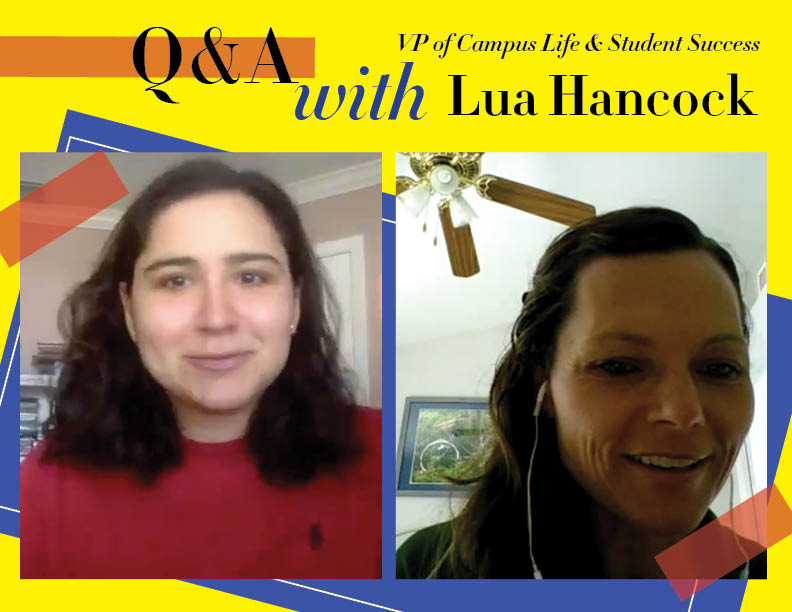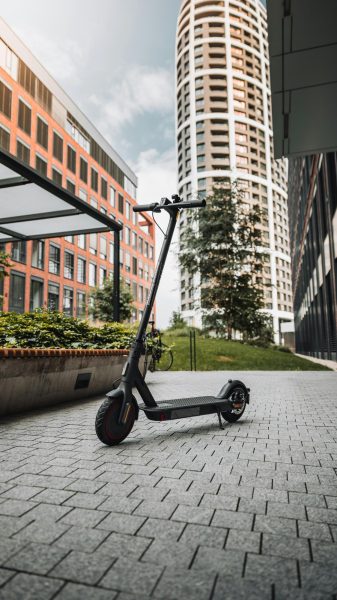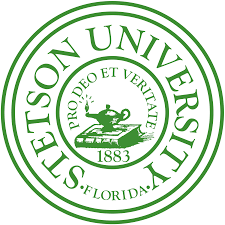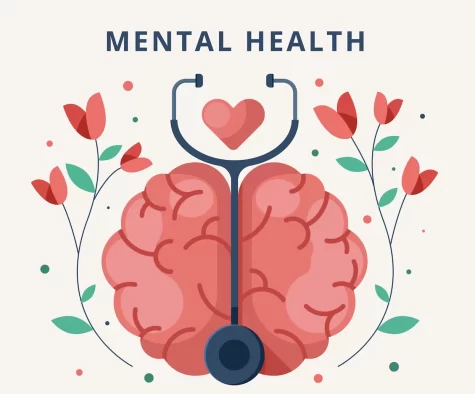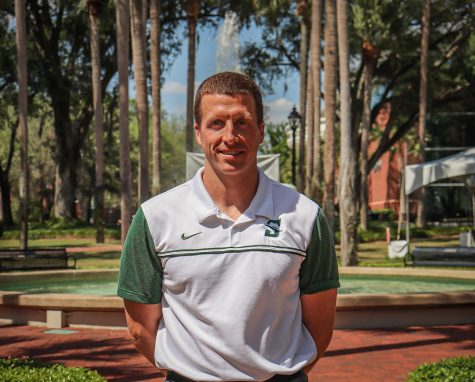What’s Happening Behind the Scenes? Q&A with Dr. Lua Hancock
With COVID-19 craziness and mass emails being sent out here, there, and everywhere, I decided to catch up with Vice President for Campus Life and Student Success, Lua Hancock, Ph.D. Abiding by social distancing rules to an extreme, we were nearly 200 miles apart when we talked over Zoom: we were in our own houses. I was in my bedroom, with a clear view of my record player and just-moved-back-in overstuffed top drawer, and she was in hers, a lightly painted room with a ceiling fan with light streaming in, and sounds of her family in the background. We spoke last Friday so I could learn how decisions are being made, what’s happening on campus, and how she’s doing with everything going on.
Our conversation has been condensed and edited for grammar and clarity.
Hatter Network: The first question I have for you is what did your job look like before this and what does your job look like now? What was a day for you usually and what happened once everything changed? How did things shift?
Lua Hancock: So normally I supervise nine people, so the supervision of those different people within campus life and student success. So Lynn, Larry, the director of public safety, Title IX, those kinds of things. That does take up some time just having meetings with them and that type of thing. Running divisional meetings, I do usually have some student meetings, whether I meet with SGA or individual students who have concerns, those types of things. A not-so sexy part of my job is I do judicial appeals. So if there’s like, an appeal that comes, sometimes I see those. And then I do, kind of, some administrative stuff everyday, I’m on the president’s cabinet, so the vice presidents get together. So university-wide kind of decision making. Since pretty much all of that has gone on hold, these past few days I’ve started trying to incorporate some non-COVID-19 related things back into my calendar, but mentally my bandwidth is like, really struggling.
LH: I run the emergency management team, the leadership team of emergency management, I’m the chair of that. So that team has met in the past. We meet for things like hurricanes and you know, issues. We also once a year run a tabletop drill. So we run through examples of things that might happen like a building fire, or a couple of years ago we ran through like what happened if we had like a big norovirus when that was an issue, like on a cruise ship or whatever. So we’ve actually kind of run through something like this. And at the time when we did it, people had little pink cards and if you got handed one that meant you were sick and you had to like leave the room so we could figure out how to work with different staff missing. So pretty much that group is a core group of people, but then it adjusts a little bit depending on the issue.
LH: So for example, in that group right now is someone from WORLD international learning. They’re not normally on the emergency group but they are right now because it’s such a component or Elise from risk management is on there. A lot of the VPs, myself, Cathy from Health Services, Cathy Rinehart has been on there this time. She’s not normally on there. Lynn is the name of Dean of Students obviously and we just are kind of figuring stuff out, there’s a lot of moving parts to this sucker. You know, trying to figure out the going online all of a sudden, and then trying to figure out the services, the housing, the liability for students, the health components. It’s been a lot of moving parts. So pretty much that’s all I’ve been doing.
HN: Whoa that’s kind of a lot.
LH: No, that’s fine. I mean, plus I have two kids at home. My boys are almost 13 and 16 and so, you know, trying to run meetings while they’re there is fine. Totally fine. So that’s been a little crazy as well. [You might] hear them screaming in the background. So they start online school on Monday so then they’ll have a little to keep them busy. But yeah.
HN: So tell me about the meetings that you guys have leading up to the emails that you send us students. What goes on in those meetings and how do you consolidate all the information to send us?
LH: Yeah, so there’s also a few subgroups meeting all the time. So there’s a subgroup who’s who’s deciding about international [students]. And that changed so quickly, right? So in the first group we’re saying who is [from] a level three or four country? Do we need to bring them home? Are they quarantined in that country? How can you know? That kind of thing. Then we’re deciding [whether to] cancel a study abroad moving forward until how long? Like do we start canceling summer trips? Do we wait? So those are the kinds of things that group is talking about. Their little subgroups who work on things like finance or international or HR issues who work on those outside of the group. So that in the group we can mostly have proposals and make decisions like, what do we need to do next? And then we keep a list of the next set of things that we hope doesn’t happen, but that might happen.
LH: So on that list right now, for example, is if the city, state, County or country decided to do a shelter in place for us in Volusia, like what would that look like? What would we do next? How does that impact the students? So we also have like a list of upcoming issues at all times and a list of things we know we need to talk about. But we’re not quite there yet because we don’t have any idea yet. For example, how this might impact enrollment next year or will it, so we’re always making decisions about things like, is it safe any longer to have guests on campus? If it’s not, how should we address that? You know, those types of things and like the email communication to students about staying on campus. We thought many more students would choose to go home. Then that’s kind of where we told students, Hey, it’s your choice to stay or go.
LH: I thought most students would leave, about 600 or so students decided to stay. Then we got a little more nervous. Like if we did go to a shelter in place, if there’s less and less services on campus, if the states that the students live in close their borders or something, there were a lot of people here so we sent a few more, like nudging communications. Like, do you realize how serious this is? Like you might end up here and your parents and somewhere else. And so at this point we’re down to this weekend about 450 students who are staying on campus and about half of those students will be moving either [Friday, March 27], [March 28], or [March 29]. So that’s what that group is always doing is figuring out what’s open, what’s closed, what’s the next thing on the list. And kind of the logistics of all the moving parts.
HN: So are you working remotely or are people coming into campus still and meeting in person?
LH: Yeah. So on Monday we made a decision, um, partially because the College of Law, there’s two counties near the College of Law, Hillsborough and Canela. So one of them went to a shelter in place, which is a lot of the staff. For example, for us in DeLand when Orlando went to a shelter in place in Orange County, we don’t have that many staff from there, but we do have some. So those staff are now staying home. We also made a decision very early that if you had issues with childcare or caring for elderly parents or you had a medical condition that was high risk to work from home right away. And what was really cool actually, was the emergency management team and cabinet met. We talked about the fact that some of those employees don’t have enough leave time to do that.
LH: Or if they get sick and we tell them not to come to campus, you know, they don’t necessarily have enough leave time if they have to take care of small children. So we granted an additional 80 hours of leave that people can have if there’s a COVID related issue with childcare or health care of yourself that you need to take care of. And it’s been really cool to watch the cabinet and the emergency management team put our values into action like that. I mean those are big decisions. And we originally also stated a while ago, that any hourly employees who are told that they have to work from home if they can’t find alternative work for them, like something they could do from home, if they’re on the ground crew for example, and there’s nothing else they can do, we’ll pay them anyway. And it seems like you know, that’s what you should do, which is what you should do.
LH: Lots of schools financially are not in the state where they can do that. So, luckily we are. Starting [yesterday] we made the decision that all of the DeLand staff will switch to essential personnel. So many more people will be working from home, but many offices, because we do still have almost 500 students on campus are going to more of like a blended environment. So the Dean of students and VP offices, the same thing. One stop is the same way where we will be open all the time. We usually only have one person in the office though instead of the five who normally are there. So I’ll come in on Wednesdays and Fridays and then someone else will come in on Monday and we’re kind of working it out. For example, health services will stay open, counseling will stay open, the CUB will stay open.
LH: Some other areas like the library is closed, but you can get resources from them, you can access resources from them. It’s different than like in a hurricane where we close down and go to essential personnel only. It’s pretty much housing, dining facilities, and public safety. And that’s it because there’s no classes going on. But this is a different scenario. Students are in full time classes, students are living on campus. So if we go to a shelter in place, I’m sure less people will be told to come in, but we will still be supporting our educational mission for the rest of the semester.
HN: Yeah. Wow. I was really astounded. Maybe astounded is the wrong word. I’m amazed that you guys made a decision and happy you guys made the decision to allow students to stay on campus because there was all that talk, I don’t know if you’ve heard about Harvard and how they were just kicking people out and I was like, you know, what’s going to happen to us? And you mentioned putting your values into action and I think that really shows that. Is that how you guys decided to allow people to stay on campus or how did you come to that decision?
LH: Well, we know that, so schools kind of did one of three things. They either said, everybody’s got to go and we’re closed. And some of those did that. Like you have 48 hours, get your stuff. Some schools made a list of kind of essential residents, so you had to petition and say, “I’m an international student who has nowhere to go,” or “I’m homeless other than living here,” that type of thing. And then a lot of schools did that. So they have students on campus but maybe less than a hundred or something like that. And then we decided that we, I know our students, my staff knows our students fairly well, so we know the amount of international students, which on campus is something like 100 or 150, something like that. And then we also know of a lot of students who, because of their financial situation or their situation with their parents or they aged out of foster care, so Stetson is their only home.
LH: It’s part of the reason why we have housing year-round. You never fully have to move out because we know that some students need it as their primary home. And then as different state hot spots started to pop up, we knew we got contact from parents who, for example were in Colorado or New York who said, “I don’t want my kids to get on a plane right now and come to New York.” Last I checked a couple of days ago, New York had a fifth of the cases in the horrible and so we didn’t want students getting on a plane and going to New York. So we decided, you know, if you have somewhere to go locally, please do it. And we had to kind of tell students, ‘cause they were staying on campus, many of them,’ cause they were seniors and they didn’t want to give up their senior year, which I totally get, I totally get it.
LH: But they were driving home to their parents house over the weekend and then coming back and like that wasn’t great, it’s too much germ exposure. So we kind of said that “if you have somewhere to go, just go there and be there, but if you need to stay here, then stay here.” There’s been a lot of opportunities both with finances and other decisions we’ve made to really display who we are. That’s why we have the webinars for both parents, students and we had some for staff. People came here because of individualized attention because they like us, they liked the small environment, they like who we are. So we thought the most important thing we can do, because in these emergency cases, communication is key. As you know as a communicator, it’s like really, really, important [to communicate what’s happening] or else people feel like [we] don’t hear [you] or [we] don’t know what [you’re] going through.
LH: So the webinars were great because students and parents can ask us questions directly. They could see Dr. Libby and the provost and myself face to face saying what’s happening. The same thing on the HR side. Dr. Libby, Bob, who is the CFO, and the director of HR, to all the shifts of public safety and facilities because they don’t always look at the email or access a webinar, at 10 o’clock at night and said, “Hey, here’s what’s going on, what questions do you have?” So the time we’ve spent in communication has been really, really important. And it’s just who we are. It’s a great time for us to show who we are.
HN: I think that’s great. Especially about the individualized attention thing, but it also must be hard because a lot of students are probably coming to you and talking at you and saying like “these are all the things that suck and I want them to be fixed.” How does that make you feel? How do you feel when you’re in a situation like that?
LH: Well, partially like that’s my job all the time. So I’m sort of used to it. There’s going to be a group who’s a little bit unhappy at any time, which is okay. I always joke there’s like 20% of people love things like they’re great. They just started the hugest Hatters. Twenty percent of people are always a little cranky and like 60% are cool. They go with the flow. So I’m kinda used to that a little bit. In this situation I would say there’s been a little bit of it around things like the housing refund or pass/fail or whatever. But mostly honestly, people have been like, “we all get it, we get what’s happening, we get how complicated it is.” Mostly it’s been great and I’ll tell you, even on social media, and you might’ve seen some of this when students or parents or different people ask a question or obviously like a little salty about something that happened, other people in the community respond back to them.
LH: And to me that’s a sign that we’ve done really good communication. Mostly I’ve been leaving more space for people to self-correct each other because we have done good communications within the community. I think also with parents and students who show stress, a lot of it is because they’re just genuinely stressed like this. What’s happening in the world is stressful. And so sometimes you find the one in front of you and you’re a little upset about something, it’s easy to take it out. But that’s okay, I get it. You know, we are all giving each other a lot of grace during this period because everybody, everybody is outside of their comfort zone.
HN: Yeah, I was on the phone with my grandma who I think is 84 now and she was telling me that she’s never seen anything like this and that it’s insane and it’s just, I don’t know.
LH: Yeah, I’ve been thinking about my kids. Like, is this going to be like their defining thing? You know, like this is, they, are they going to remember. They weren’t around for 9/11. I remember 9/11 [because it was] when I was in grad school. It happened. But like this is kind of their big defining incident.
HN: Yeah. How are they feeling about it now? Do you talk about it? Have you explained it even to the 13 year old? Do they understand?
LH: They do. I think that, you know, the way that when you talk about it as parents with anything in the world kind of drives the way that they view it. I would say mostly it’s been like they’ve had fun having a break. What’s been so interesting I would say the most is like, so they’re starting school [yesterday] online. But what’s been so interesting to me is that, my kids, like a lot of other American kids are really busy. Like we have soccer practice and then we have trumpet and we have band, we have whatever. And that all just like totally stopped. So on the weekend we would normally have a soccer tournament or rock climbing tournament. Now we have nothing. So we’ve been spending a lot of time together playing games, board games, and card games and catching up with each other.
LH: And the kids are like playing in the pool right now and [we’re] having lunch together, having dinner together. My family [usually] has dinner together right now about once a week. And so now we’re having dinner together every night. So it’s kinda cool. It’s, and my cat is so happy that everyone’s here. She’s like, “what happened? Why is everyone home?” So it’s I think a chance for all of us to reevaluate and be like, “Man, do I want to be as busy as I was before?” You know, also I recognize my privilege. Like my husband and I both still have a job. Like some of my friends, that’s not the case. I have friends who work at a dentist’s office or [are] yoga teachers and they’re out of work. They’re not getting paid. So for my kids it’s a little easier in the fact that it’s not disrupting our family in that way.
HN: Yeah. ‘Cause I was reading an article that was published in Slate that was saying something like, how we’re never going to go back to the way that we were before. We’re all just [going] to want to stay inside. And I was like, I don’t think that’s going to happen. I think it’s honestly going to be the complete opposite when people are going to realize, “Oh my God, I have to go out and start living my life.” You know, I can’t be so cooped up all the time so I can move.
LH: I agree with that. Yeah. I hope that it does make us realize like we’re interconnected in the world. Like there’s no real like borders or manmade countries, all these things, you know? And so the issues of another country or another issue are all of our issues. I mean this in a dramatic way, right? But we have to figure out. I asked my elderly neighbors if I could get their groceries, I went to Persimmon Hollow and different places downtown and tipped them really big. You know, like I hope that that part of it, that like connection that we care about each other, that we’re helping each other out, that we can give free sick times to people who are sick and at home with their kids. That kind of stuff. I hope that if it grows a little bit of humanity that would be awesome.
HN: Yeah. I think that especially the things that you’re doing, things like that a lot of people have also begun to do. I know a guy who moved here from Panama in high school and he said when he moved here he expected people to come with like an apple pie on his doorstep ‘cause you know this is America, and that is like what we supposedly do. ‘Cause that’s what he saw on TV. But everybody he met when he moved here was cold and closed-off and busy and would ask how are you, but nobody would actually care how you’re doing. And I feel like with this we’re really gonna start to, like you said, make those connections again and hopefully get off our phones. I don’t know. I just want to, I miss face to face. I think this will make people realize that face to face stuff is really important.
LH: Well it’s making me really me present, right? Like I have to be present with who I’m with right then even on technology like this, you know, I need to be present in the moment with who I’m with. I’ve been keeping a little side journal and [I was thinking that] I should force my kids to do that because I think, you know, we believe in experiential education. I believe in study abroad and internships and community engagement and why? Because it’s like this super intense learning experience. Like when you’re outside of your comfort zone, you’re learning so much about yourself and other people and if you do studio study abroad or community engagement or an internship, right? You also are never quite the same. You have a worldview shift.
LH: For education, I think there are two different types: one is information and one is transformation. And this, I feel like we’re all kind of in this transformational educational moment together. So [when I’ve been] journaling on the side, [I ask myself] what do I want to hold on to? What changes? What does this mean about us? What does this mean about Stetson? What lessons am I learning? You know, and hopefully some of that will stick with us. I think some of it will go back to the craziness it was, but if we could shift a little bit in the more humane direction, that’d be cool. I think we’re also all getting much more technologically literate, which is very true. I told IT, I said, “I know you’re like swamped and crazy busy right now, but the good news is all of us just took a humongous technological [jump], so we’re going to be able to do a lot more than we did before.”
HN: That’s so true. All right, so what should students know about you, about the situation or about the work that you’re doing or administration as a whole? What should we know about the kinds of work that you have mentioned before that you’re doing behind the scenes stuff that we might, I don’t know, complain about. What should we know?
LH: Well I think there’s like a couple of different goals which sometimes can seem like they are in contradiction or in challenge with each other, right? But this is my job all the time. My main goal is to provide the biggest educational transformation for students possible. That’s why we have the type of school environment that we have. For example, we have a residential living requirement. Why? Because we believe it’s part of your educational transformation. That’s why we haven’t, I also do have to keep an eye on the finance. And I think sometimes people don’t realize that as much as, you know, something around 86% of our budget is still driven by students’ tuition. We are not an institution with a lot of rich students. The president just gave the university a big, huge gift by doing such a successful capital campaign so that we don’t have to be in the place that some other schools our size are.
LH: I’ve been talking to some of my VP colleagues online who are in schools our size who don’t know if they’re going to make it through this financially and we don’t have to worry about that. I mean there’s a lot of schools that when you’re as tuition driven as we are, 86%, so for example, like the meal plan loss to give people back the meals that they didn’t eat, which we should do, is approximately a $3 million loss for the institution, that’s not in the budget. So we will gain back some things by the fact that we canceled a bunch of conferences, and events and you know, so we’ll gain back some, but we won’t be getting back that much. So I think those really complicated conversations and I’d say the challenging part is not over. I mean, first of all, part of me still worries. Could we have more illness where we are? The jury’s kind of out on that.
LH: Some people believe that some parts of the United States are hotspots and some won’t get it as much because we’re more rural. Maybe we don’t have public transportation, but some people think like, we just haven’t gotten there yet. Like we’re still coming. So I do worry in the more immediate about the physical health of our community. We haven’t had any cases, you know, which is great. We’ve had, uh, some people tested and they’ve all been negative, which is great, but there is a part of me that worries like, man, is this just a matter of time with how it went or this thing in the longer run, we’ve started to think about, I hope none of this happens, but what if students can’t move out in May?
LH: Like, what if this is still going on? What if, you know, I don’t know how it’s going to impact retention. Like are students going to be like, “man, Stetson did a good job and I want to come back” or are students going to be scared and they’re gonna want to be closer to home. I don’t know, we don’t know how enrollment is going to work. So I think people need to know like we’re making decisions as quickly as we can with what’s in front of us, but there’s still a lot of hard work to do. We’ve also been engaging our new president, Dr. Roellke, I talked to him almost every day at this point, because he needs to weigh in on things like commencement. He needs to weigh in on that. He needs to have some input. So it’s been really cool to work with him.
LH: And Dr. Libby also has been working her butt off. My gosh, she’s this close to retirement. I feel bad for her sort of like I feel bad for the seniors. Like, this is her last hurrah, she’s been a president at a bunch of schools and her last few months is going to be this. So I joked a little bit when we decided to go to online education at that emergency management meeting, I said to her like, “congratulations on your retirement, this is your party.” I think everybody just needs to realize everyone’s human. We’re all human. One thing I hate in higher ed is when students say, things like, “Oh the administration doesn’t care ‘cause whatever.” But I also hate when the administration says, “Oh students don’t care cause they are whatever.” For students, faculty just don’t get it cause they like, we all know that’s not true. That’s easy for us to try to say. But the reality is we’re a pretty awesome community collectively. Like the students are pretty amazing. The faculty are pretty amazing. Administration is pretty amazing. We have our pluses and minuses, but it’s not bad.
HN: Yeah. But go back to Dr. Roellke, I forgot about him. So when you talk to him, what is he thinking? Is he freaked out? Is he trying to work on Vassar as he tries to work on trying to help us? How is that working?
LH: Well, you know, he is, I would say the one who usually very politely and wonderfully raises the flag like, “Hey guys, just be careful if this gets worse” ‘cause he’s in New York and so he’s coming from a very different experience than we are. He’s living in New York and so you know, everything’s closed. Like you’re not supposed to be out, there’s curfews and whatever. I would say that he’s doing the stuff he should be doing, which is he’s weighing in on things like commencement, but he’s also saying, “Hey, I’m not there yet. I trust y’all’s judgment. Like, you know a lot more about this than I do.” And Dr. Libby and Dr. Roellke are both saying like, “Hey, this is sorta your commencement.” Then the other one’s like, “No, this is your commencement.” So they’re going to share it in some way. They’re both being super awesome with each other cause Nope. You know, so, I would say that he’s been very smart. He asked really good questions, but he’s also been very respectful of the fact that he doesn’t have the full context yet of the institution and he wants us to dig in, you know, when we feel like we have some idea on the finances of the future, obviously that’s something he should be concerned about. Overall he’s been great. He friended me on Facebook today!
HN: All right. I think that’s about all I have for you. Is there anything that you haven’t talked about that you feel like you should tell me?
LH: Yeah. The only other thing I’ll mention is how impressed I’ve been with students’ resiliency. Like student government, I’ve been meeting with George, like he’s still on campus. He’s still moving right along, like figuring out, and he just became the president for longer cause they extended SGA elections, and he’s thinking about the student fee, and he’s weighing in on things like pass/fail and he’s writing letters to the provost to say, “this is what I think we should do about grades”. And so he’s still super engaged. I think as a student it would be really easy right now to just be like, “Oh my God, I got to focus on my academics and get my stuff together.” The same thing, like you guys had Uncouth Hour last night. BSA has this unbelievable social media going on and they’re talking about hot topics, and so I guess the last thing I would just mention is our students never cease to amaze me. You know, they’re really, really cool people. They’re why I do this. I love the genuineness of the student population. Every school I’ve worked in, the student population kind of has its own personality. And just the, the genuine, hardworking, compassionate, and socially intelligent. Our student population is just really amazing. Present company included.

Ruby Rosenthal is prone to few things: making jokes in inappropriate situations, checking out more books from the library that she can feasibly read, and...


